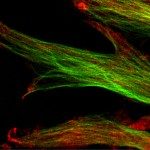Link to Pubmed [PMID] – 9098065
J. Bacteriol. 1997 Apr;179(8):2658-67
The 739-codon rel(Seq) gene of Streptococcus equisimilis H46A is bifunctional, encoding a strong guanosine 3′,5′-bis(diphosphate) 3′-pyrophosphohydrolase (ppGppase) and a weaker ribosome-independent ATP:GTP 3′-pyrophosphoryltransferase [(p)ppGpp synthetase]. To analyze the function of this gene, (p)ppGpp accumulation patterns as well as protein and RNA synthesis were compared during amino acid deprivation and glucose exhaustion between the wild type and an insertion mutant carrying a rel(Seq) gene disrupted at codon 216. We found that under normal conditions, both strains contained basal levels of (p)ppGpp. Amino acid deprivation imposed by pseudomonic acid or isoleucine hydroxamate triggered a rel(Seq)-dependent stringent response characterized by rapid (p)ppGpp accumulation at the expense of GTP and abrupt cessation of net RNA accumulation in the wild type but not in the mutant. Tetracycline added to block (p)ppGpp synthesis caused the accumulated (p)ppGpp to degrade rapidly, with a concomitant increase of the GTP pool (decay constant of ppGpp, approximately 0.7 min(-1)). Simultaneous addition of pseudomonic acid and tetracycline to mimic a relaxed response caused wild-type RNA synthesis to proceed at rates approximating those seen under either condition in the mutant. Glucose exhaustion provoked the (p)ppGpp accumulation response in both the wild type and the rel(Seq) insertion mutant, consistent with the block of net RNA accumulation in both strains. Although the source of (p)ppGpp synthesis during glucose exhaustion remains to be determined, these findings reinforce the idea entertained previously that rel(Seq) fulfils functions that reside separately in the paralogous reL4 and spoT genes of Escherichia coli. Analysis of (p)ppGpp accumulation patterns was complicated by finding an unknown phosphorylated compound that comigrated with ppGpp under two standard thin-layer chromatography conditions. Unlike ppGpp, this compound did not adsorb to charcoal and did not accumulate appreciably during isoleucine deprivation. Like ppGpp, the unknown compound did accumulate during energy source starvation.

